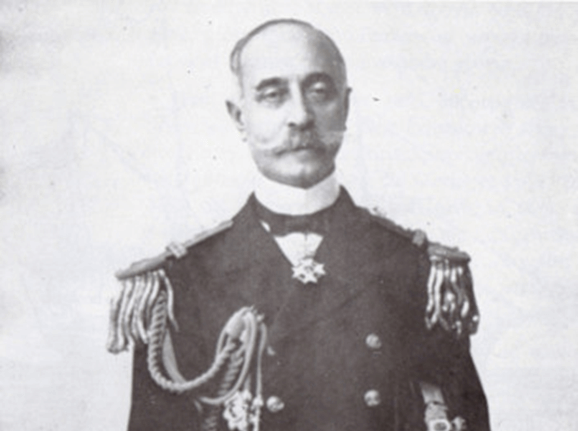Pavlos Kountouriotis (9 April 1855 – 22 August 1935) was an admiral of the Royal Navy and commander of the Aegean Fleet during the Balkan Wars. He participated in the government of Thessaloniki as a member of the Triandria and was twice President of the Republic.
He was born in Hydra and was the son of Theodoros Kountouriotis, consul and parliament member, and Loukia Negropontis. On his father’s side he came from the Kountouriotis maritime family and was the grandson of George Kountouriotis, the owner and president of the first provisional government of revolutionary Greece, as well as his brother banker and politician Ioannis Kountouriotis, while from his mother’s side he came from the chian family Negrepontis and was the great-grandson of Constantine Hatzeris, ruler of Wallachia.
Following the family’s naval tradition in 1874, at the age of 19, he joined the Royal Navy. In 1886 as Sub Lieutenant and cannon commander was distinguished in the bombing of the Preveza fortress, where he escaped under the bow of Turkish ships with minimal damage and loss. In Crete during the Greek-Turkish War of 1897 with the rank of Commander, as the captain of the steamship “Alfios” he landed the expeditionary body of Colonel Timoleon Vassou at Kolymbari of Chania and at Skala Leptokarias in 1897. Captain Kountouriotis then made his first overseas trip to the US. In 1908 he became an advocate of King George I and was promoted to captain the following year.
In June 1911 he assumed the position of Commander in the newly built Battleship “G. Averof “with the rank of Captain. With the outbreak of the Balkan Wars he was promoted to Rear Admiral. He then becomes head of the Aegean fleet and takes action. It occupies Limnos, Thassos, Imbros, Tenedos, Psara, Agios Efstratios and Samothraki in the following days. It manages to liberate almost all the Aegean islands, including Chios and Lesbos. With the Battleship “Averof” the head of the Greek Fleet, he participated in two naval battles, the Elli (December 3, 1912) and the Limnos (January 5, 1913), during which he overwhelmed the Turkish Fleet and gained full control of the Aegean.
At the end of the Balkan Wars, he was promoted to Vice Admiral due to his excellent service. He is the first Greek after Constantine Kanaris to receive this rank. Subsequently, on October 25, 1915, he retired and then took over the Ministry of the Navy. Disagreeing with the neutrality policy of Greece in World War I, in September 1916 he joined the National Defense Movement and moved to Thessaloniki, where he participated as a member of the Revolutionary Government’s Triandria along with General Douglas and Eleutherios Venizelos. In June 1917, after the expulsion of King Constantine, Greece was reunited and Koundouriotis returned to Athens, where he once again assumed the Ministry of Navy portfolio, actively working to reconstitute the Greek fleet. At the end of 1919 he resigned from the Ministry of the Navy and demobilized, receiving the rank of Admiral Hon.
After the sudden death of King Alexander on October 12, 1920, he was called upon to assume the duties of Regent until November 1920 and to hold elections, which E. Venizelos had already proclaimed. Also, after the end of the Asia Minor Campaign and the ensuing catastrophe in August 1922 and after the expulsion of King George II from the country, in December 1923 Admiral Koundouriotis was again required to assume the role of Regent until March 19. Then, with the leverage of A. Papanastasiou, the Republic of Greece was proclaimed. The National Assembly instructed Kountouriotis to temporarily hold its High Office, the Presidency. As a person of great prestige and widespread acceptance, he was essentially re-named the first President of the Hellenic Republic. In June 1925 General Theodoros Pagkalos overthrew Michalakopoulou’s government and in January 1926 overthrew the Hellenic Parliament, establishing a dictatorship. Kountouriotis, in protest, resigns from his post and leaves for Hydra. In May 1929 he was re-elected by the Hellenic Parliament and Senate to the post of Regular President of the Hellenic Republic, a position he resigned permanently this time for health reasons in December of that year.
He was twice married: In 1889 in London with Angeliki Petrokoukini (1865-1903), who died of natural causes and in Athens in 1918 with Eleni Kouppa (1876-1957). He had three children with his first wife, two girls and a boy. His son, Theodoros Kountouriotis, who joined the Hellenic Navy, was Captain of the battleship “G. Averoff” during the return of the Fleet to Greece after the Occupation. His grandson Pavlos, son of Theodoros, also made a career in the Hellenic Navy and took over as the first commander of the Averoff in 1984 following the decision to regenerate the ship again.
He died on August 22, 1935 in Paleo Faliro and, even with his death, taught modesty to the nation. In particular, he had in his covenant sought to avoid any futile procession during his church ceremony and burial, for which he had wished to be done at his family tomb in Hydra. He demanded that the ceremony be held in the small church of his family and that it be performed by a single modest priest. It is worth noting that his casket was guarded by four petty officers headed by an officer. In his covenant, expressing his love for his family and preserving his ancestral tradition, his thought turns to the whole Homeland, to which he devotes his last words: “All my affection belongs to Hydra, all my soul wishes God keeps Greece safe.”



